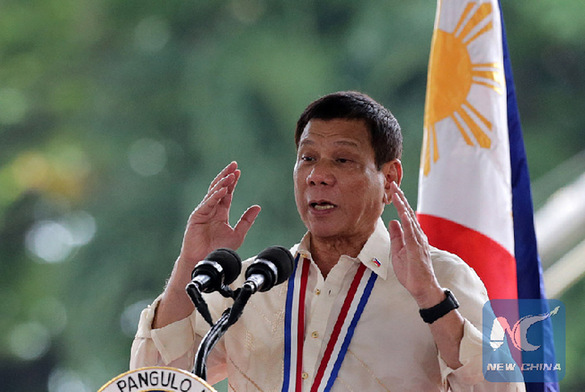Duterte's dilemma
- By Sumantra Maitra
 0 Comment(s)
0 Comment(s) Print
Print E-mail China.org.cn, March 21, 2017
E-mail China.org.cn, March 21, 2017
|
|
|
File photo taken on Aug. 29, 2016 shows Philippine President Rodrigo Duterte speak during a commemoration of the National Heroes Day in Taguig City, the Philippines. (Xinhua/Rouelle Umali) |
A few months back, when Rodrigo Duterte won the elections, I believed there was a new alignment in the making in South East Asia.
Duterte came to power promising three things: One, he would clean up the Philippines in regard to crime overall and drugs in particular. Two, he would seek more economic investment and diversify his trade. Three, he would be more neutral and equidistant in his approach to foreign policy.
At home, he supported a scorched earth policy against drug gangs, peddlers and even addicts. Of course, he was criticized by the West on human rights grounds and is also accused of neutralizing his political opponents; At home however, he continues to enjoy strong support from people essentially tired of the country's drug epidemic.
His second task is also continuing. He has repeatedly been critical of the U.S., and has invited Russia and China to invest in his country.
This last aspect is the trickiest. There is no question, the Philippines leader wants to maintain equidistant ties with America and China. Yet, how far is he willing, or capable of doing so? I had doubts back then, as policymakers have to be careful in dealing with any leader in the world, who is as mercurial as Duterte certainly is. I still have doubts.
Recently, as reported, Duterte has ordered his navy to construct "structures" to assist in asserting sovereignty in areas where Manila is wary of Chinese navy patrols. The area is known as Benham Rise, a vast area stretch of water to the east with rich biodiversity and fish stocks.
Manila is uncomfortable with the presence of Chinese naval vessels in that region, even though Beijing insists they are exercising an innocent right to passage and freedom of navigation.
In a press conference, Duterte looked like he was trying hard to maintain the balance of antagonizing China and asserting his strong man persona at home. "You go there and tell them straight that this is ours, but do it gently and in a friendly way," he stated.
This, he asserted, was not the time for conflicts over sovereignty and ownership, adding that he doesn't want to be a part of any proxy war in the region.
This is the key to understand Manila's direction. It is possible that the Philippines government is feeling a bit lonely. On one hand, relations with United States have declined in recent years. The constant war footing in domestic policies, has also made it somewhat insecure with regards to great power backing when it comes human rights.
Secondly, the economic ties that were supposed to materialize have yet to emerge to any great extent. Although, the relationship with China has improved phenomenally, it is possible that Manila expects more, and quickly, while Beijing is being careful and taking time to cultivate the situation.
The third possibility is that Manila is, by definition, worried about the rise of China. This, a very likely scenario and according to international relations theory, is related to "bandwagon behavior." Manila is not interested in antagonizing a rising power right next door without any explicit guarantee of other powers rushing in to save it, in the rare event of a military standoff.
In situations like these, states either seek internal or external balance. In external balance, they seek partners or other major powers for alliance formations, as evidenced by the arms sale between India and Vietnam or naval exercises between Japan and the U.S.
Manila, having exhausted these options, is seeking to balance internally, keeping a veneer of diplomacy, as it would not be prudent to suddenly militarize and act antagonistic to local strategic dynamics.
In any case, it is not clear what "structures" the Philippines is referring to; short of anything major or permanent, nothing would change the regional dynamics much.
In any case, Beijing should continue her policy of careful observation and engagement. If Manila is looking for an alliance with China, it should seek it outright, with the pros and cons all opened out on both sides.
Sumantra Maitra is a columnist with China.org.cn. For more information please visit:
http://www.china.org.cn/opinion/SumantraMaitra.htm
Opinion articles reflect the views of their authors only, not necessarily those of China.org.cn.







Go to Forum >>0 Comment(s)